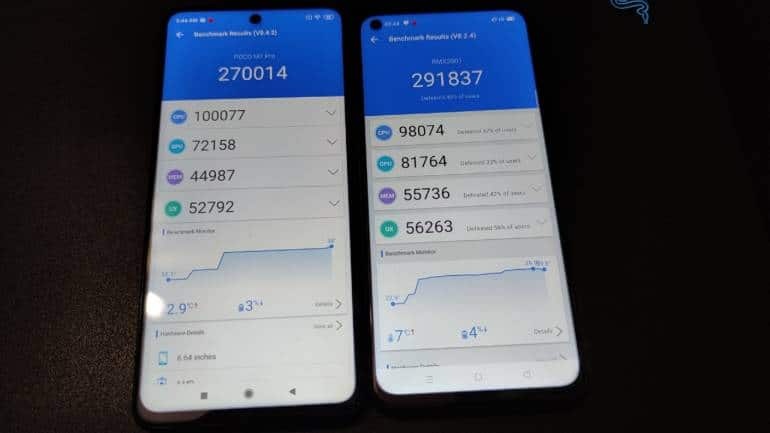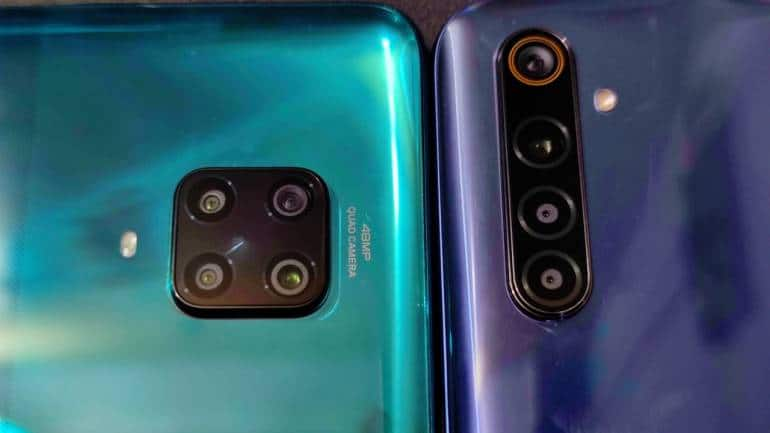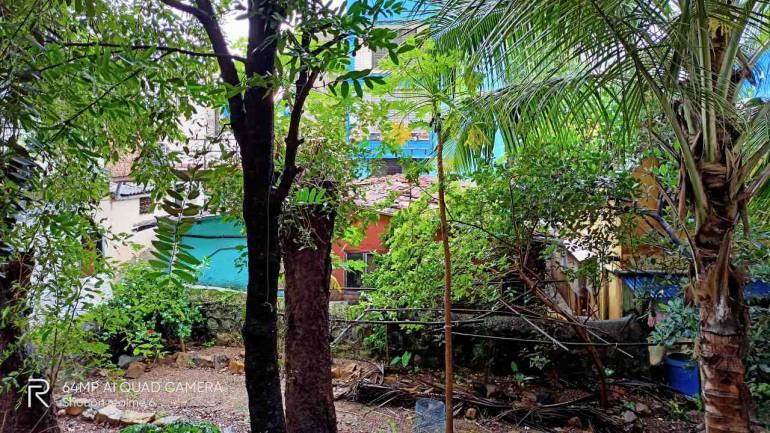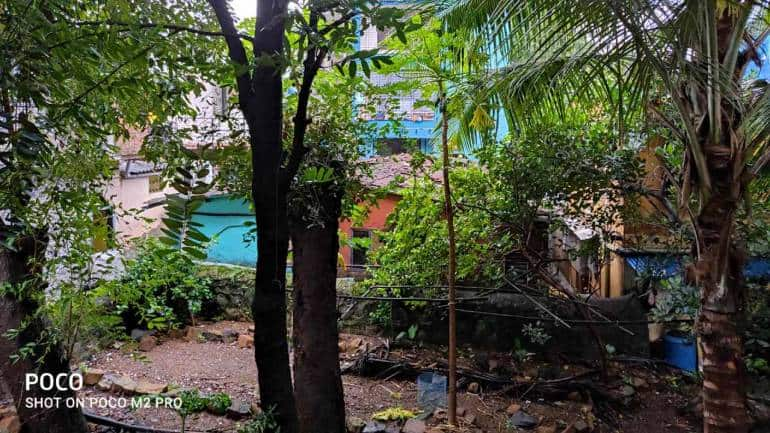Stay tuned to find out which one of the two devices offers the best bang for your buck?
The Poco M2 Pro is set to go on sale today for the first time since its launch last week. The M2 Pro arrives as an affordable smartphone that debuts in India’s sub-15K segment. We have only had the Poco M2 Pro for a couple of days, and our first impressions were generally positive, especially when considering the price of this device.
But despite its value proposition, the Poco M2 Pro is not alone at this price point. The most obvious contender here is the Realme 6. So, we’ve decided to compare both phones to see which one of the two devices offers better bang for your buck.
Realme 6 vs Poco M2 Pro| Specs | Realme 6 | Poco M2 Pro |
| Chipset | MediaTek G90T | Snapdragon 720G |
| Display | 6.5-inch FHD+ Super AMOLED (1080*2400 pixels), 90Hz | 6.67-inch FHD+ IPS LCD (1080*2400 pixels), HDR10, 60Hz |
| RAM | 4GB/6GB/8GB | 4GB/6GB |
| Storage | 64GB/128GB | 64GB/128GB |
| Rear Camera | 64 MP, f/1.8 + 8MP, f/2.3 (Ultrawide) + 2MP (Macro) + 2MP (Depth) | 48 MP, f/1.8 + 8MP, f/2.2 (Ultrawide) + 5MP (Macro) + 2MP (Depth) |
| Front Camera | 16 MP, f/2.0 | 16MP, f/2.5 |
| Software | Android 10; Realme UI | Android 10; MIUI 11 |
| Battery & Charging | 4,300 mAh battery, 30W Flash Charging | 5000 mAh, 33W Fast Charging |
| Price (Rs) | 14,999 / 16,999 / 17,999 | 13,999 / 14,999 / 16,999 |
Design
The Realme 6 features Gorilla Glass 3 on the front, while the Poco M2 Pro gets the superior Gorilla Glass 5 on the front and back. Both phones feature a plastic frame, which is not surprising at this price. Both devices also feature a glossy and reflective finish on the back. We’d suggest opting for the Two Shades of Black colour option for the Poco M2 Pro as the Green and Greener seemed particularly flashy in our view. Another difference in design between the two phones is in the camera department.
The Realme 6 opts for a vertically aligned quad-camera module on the back, while the M2 Pro has a box-shaped camera layout. Moreover, the camera cutout on the front is in the middle for the Poco M2 Pro and shifted to the side for the Realme 6. We preferred the finish on the Realme 6, but the Glass back on the M2 Pro made it feel premium in the hand. However, design is subjective and may vary based on personal preferences.
Display
Both phones feature an FHD+ resolution and a 20:9 aspect ratio. It is another matter of preference here. The Poco M2 Pro’s screen is HDR10 compliant, making it better for consuming entertainment, while the Realme 6’s 90Hz refresh rate is smoother and better suited for gaming.

Performance
In terms of performance, both phones use powerful mid-range chipsets, which are pretty evenly matched. The one advantage in Poco’s favour here is the fact that the starting price for the Poco M2 Pro is Rs 13,999, while the starting price for the Realme 6 is Rs 14,999. Since the base variants for both phones feature 4GB of RAM and 64GB of storage, Poco offers a better price to performance ratio. For comparison, the Poco M2 Pro offers 6GB of RAM for Rs 14,999. It is worth noting that the Realme 6 model featured 8GB of RAM as compared to 6GB on the Poco M2 Pro.
Battery and Software
The Poco M2 Pro certainly has an advantage both in terms of battery size and charging speed. Both Realme and Xiaomi have come along way on the software front since their first smartphones. MIUI 11 offers more customisations than Realme UI, but the latter seems to be catching up. However, Realme UI offers a relatively cleaner look, resembling stock Android. We prefer Realme UI over MIUI.
Camera
For optics, both phones feature a quad-camera setup on the back and single selfie shooter on the front. The one advantage the Poco M2 Pro has over the Realme 6 is the ability to record video using the Macro camera, which yields decent results. The 64 MP main camera on the Realme 6 features better colour accuracy but take slightly duller-looking photos as compared to the Poco M2 Pro. The 64 MP sensor also captures more details and does a better job with sharpness.

Photos on the M2 Pro also appear oversaturated, while Realme does a better job with colour reproduction. The Poco M2 Pro does do a slightly better job with HDR, exposing frame rates better than the Realme 6. In nighttime photography, the Realme 6 does tend to have the edge over the Poco M2 Pro, delivering slightly better results. However, overall night mode is quite awful on both these phones, which is not too surprising at this price.

The Realme 6 also takes better portrait shots than the Poco X2 Pro. The front camera of both phones manages to take good selfies in daylight but tend to struggle at night. The ultrawide camera on both phones is a nightmare, especially in low light, where results are almost always unusable. Camera consistency between the main and ultrawide shooter is almost non-existent on both devices. That being said, Realme’s ultrawide snapper does take more usable photos in good light.

For video, both the Poco X2 Pro and Realme 6 can capture 4K video at 30 fps, offering decent results in daylight and bright indoor lighting. Throughout this camera comparison, the Realme consistently delivered more natural-looking photos and videos and certainly offers the better camera experience of the two phones in our view. However, if you prefer bright and punchy colours in your photos, the Poco M2 Pro might be the better option. Check out some of the samples for our full comparison here.
Which one should you buy?
In our opinion, both the Realme 6 and Poco M2 Pro offer excellent value for money. In terms of design and build quality and battery life, the M2 Pro has a clear advantage. Additionally, Poco also offers more RAM for the same price. The Realme 6, on the other hand, offers slightly better performance on the main camera and is the only phone in this segment to feature a high-refresh-rate display. While we do not know if we’d recommend getting a smartphone with 4GB of RAM in 2020, the Realme 6 offers a slightly more impressive overall package, making it our pick for the best smartphone under 15K.








